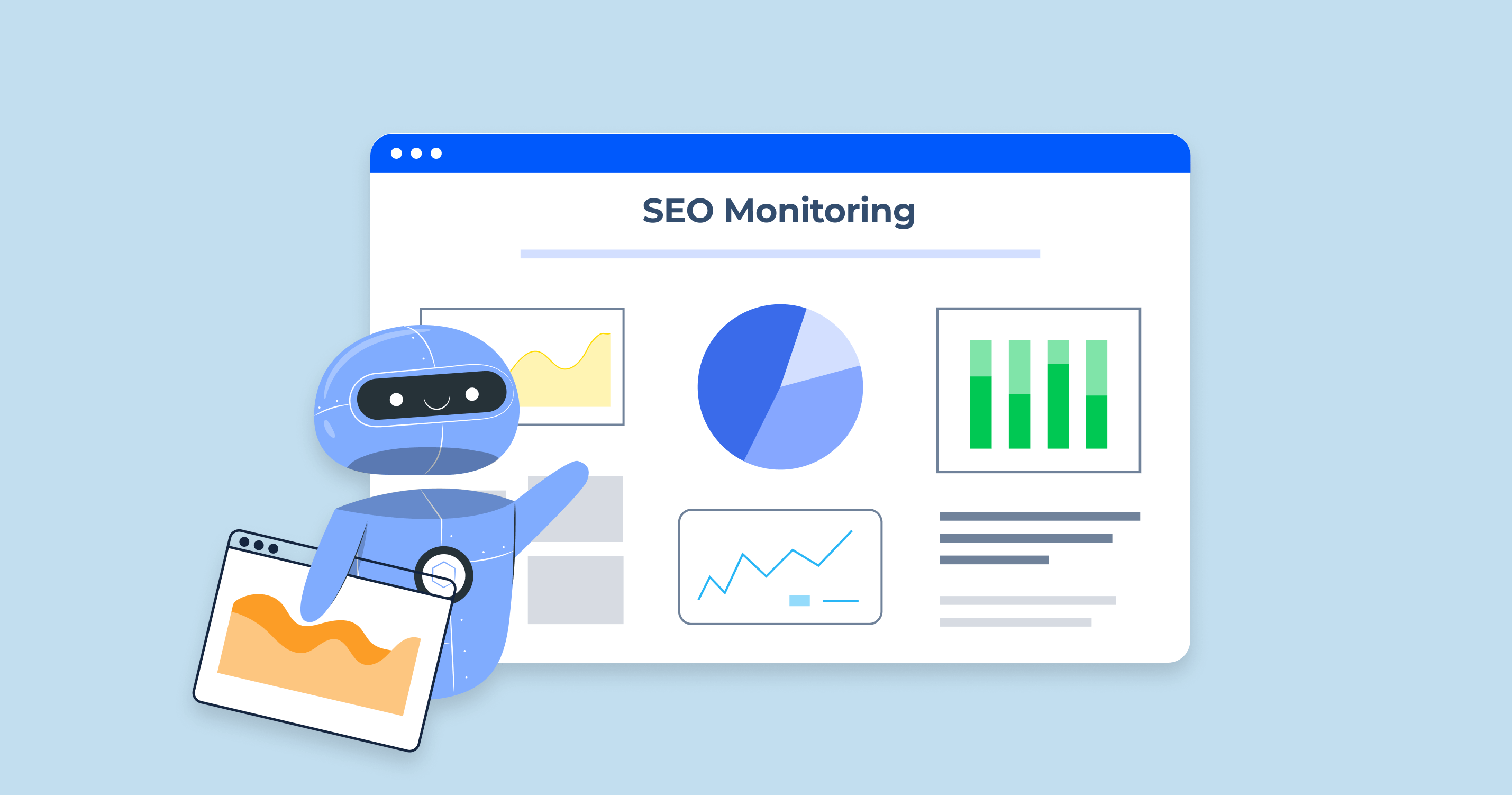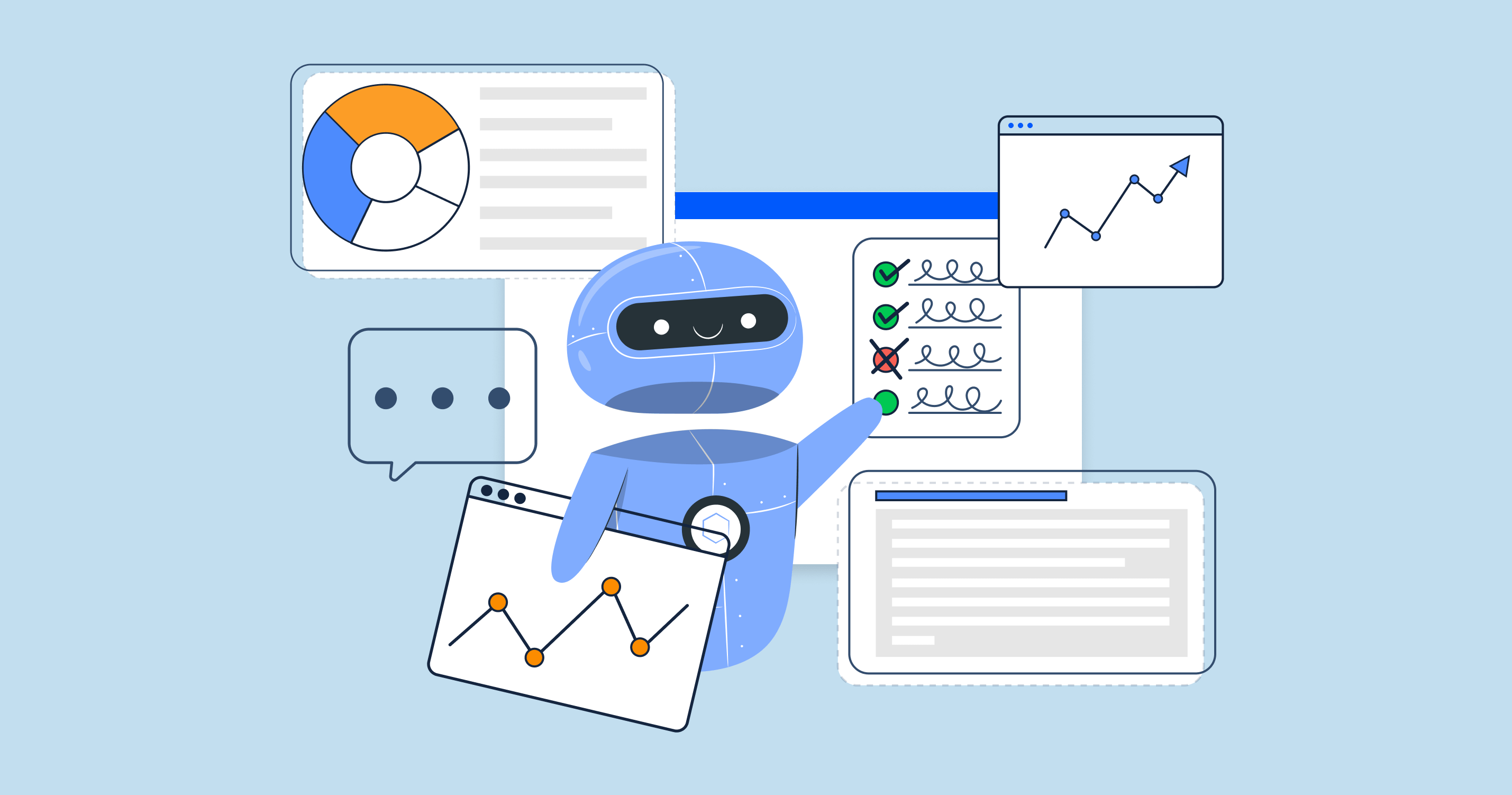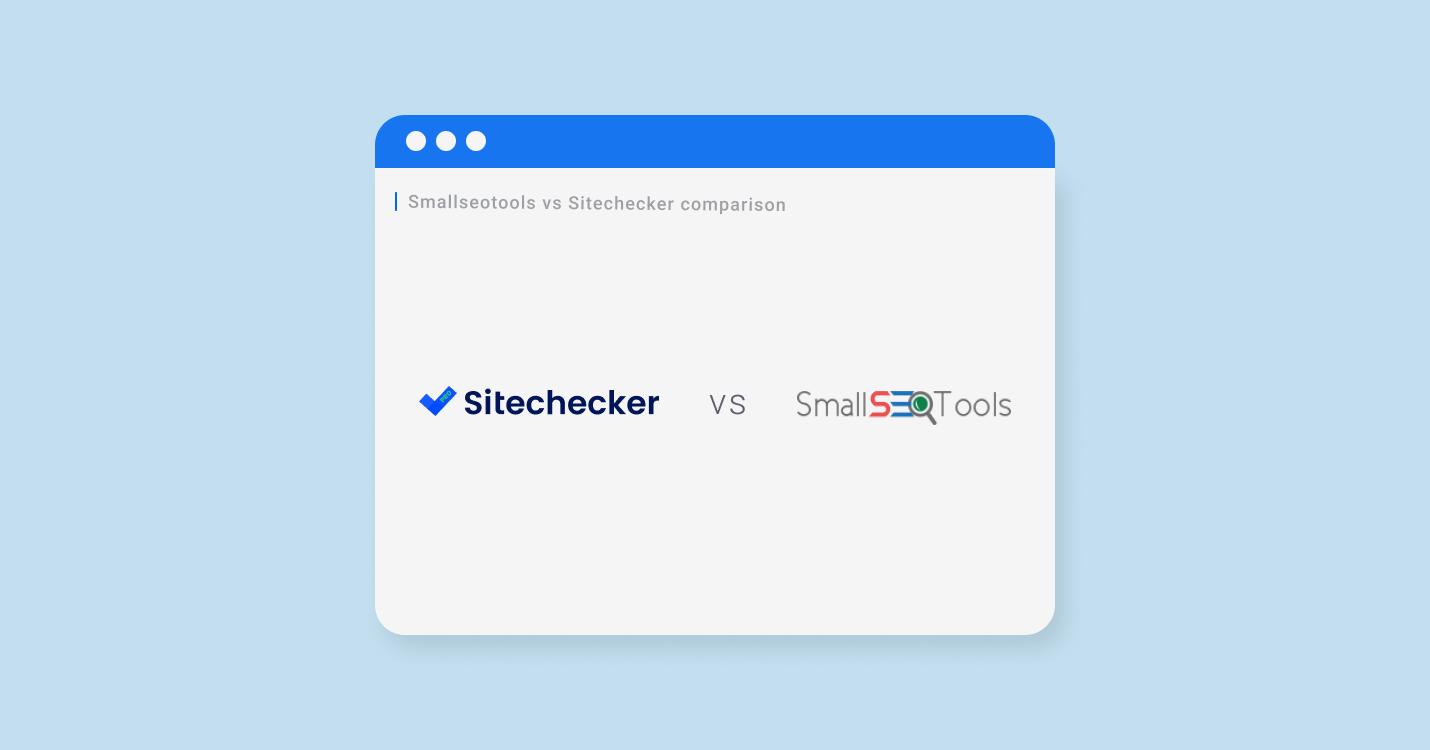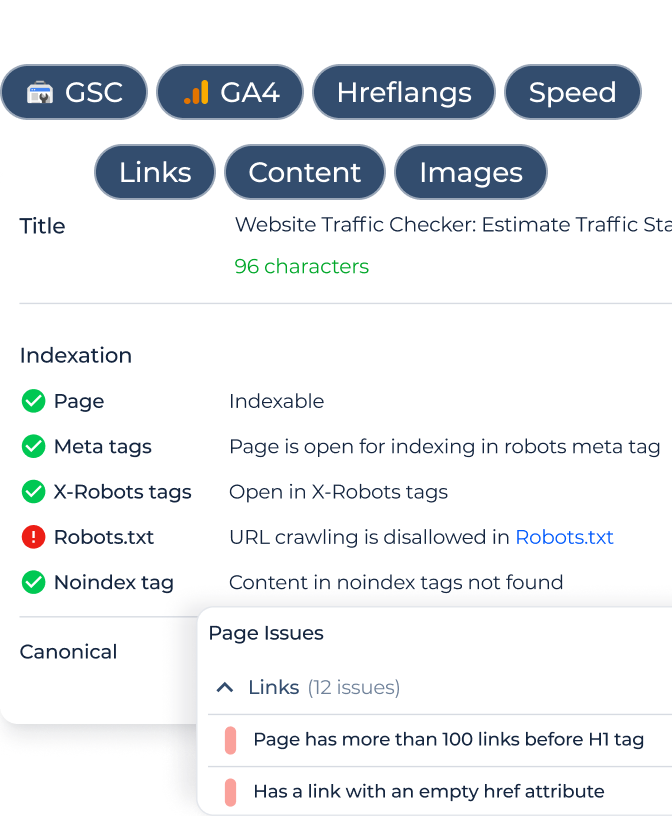What is the best rank tracker tool?
The best SEO keyword tracking software is a platform that accurately monitors keyword positions across search engines and locations, provides daily updates, analyzes SERP features and AI-generated results, and delivers actionable insights through automated reports and dashboards.
It should combine precision, automation, and usability, helping marketers and agencies easily measure visibility, identify growth opportunities, and demonstrate SEO performance.
What agencies need from a rank tracking tool
1/ Daily, accurate updates – real-time keyword and visibility tracking across all locations and devices.
2/ AI & SERP insights – monitor Google AI Overviews, featured snippets, and other AI visibility factors.
3/ Client-ready dashboards & reports – automated, branded reporting for multiple projects in one place.
4/ Multi-user, multi-project access – seamless collaboration for teams and clients without seat limits.
5/ GSC integration & performance metrics – combine ranking data with clicks, CTR, and traffic insights.
6/ Transparent pricing – all essential features included, no hidden add-ons or upsells.
The best keyword rank tracker tool empowers agencies to track, analyze, and report performance with full visibility and zero manual effort.
Below, you’ll find a detailed comparison of the top SEO rank tracking tools. It highlights which platforms deliver the most complete feature set for agencies, from daily updates and AI tracking to client reporting and team collaboration.
Best SEO rank tracking tools for agencies – feature comparison
| Feature/capability | Sitechecker | Semrush | SE Ranking | Ahrefs | PowerSuite |
|---|---|---|---|---|---|
| Local ranking (by city, device, language) | ✅ Yes | ✅ Yes | ✅ Yes | ✅ Yes | ✅ Yes |
| Keyword grouping per pages & groups | ✅ Yes | ✅ Yes | ✅ Yes | ✅ Yes | ✅ Yes |
| Daily rank tracking | ✅ Yes (default) | ✅ Yes | ✅ Yes | ⚠️ Weekly default / daily add-on | ⚠️Frequency depends on desktop setup |
| AI overview tracking | ✅ Yes | ✅ Yes | ⚠️ Indicator only | ⚠️ Partial | ❌ No |
| LLM rank tracker | ⚠️ Soon | ⚠️ Partial | ✅ Yes | ❌ No | ❌ No |
| GSC metrics inside rank tracker | ✅ Yes | ❌ No | ⚠️ Partial | ❌ No | ❌ No |
| Rank tracker reports | ✅ Scheduled email reports | ✅ PDF & scheduled | ✅ PDF & scheduled | ✅ Weekly email | ✅ Yes |
| GSC keyword import | ✅ One-click import | ❌ No | ✅ Yes | ❌ No | ✅ Yes |
| White-label branding | ✅ PDF + agency access | ⚠️ Limited | ⚠️ Limited | ❌ No | ✅ Yes |
| Keyword cannibalization analysis | ✅ Yes | ⚠️ Limited | ✅ Insights module | ⚠️ No dedicated tool | ⚠️ Limited |
| Unlimited users per project | ✅ Yes | ❌ Extra seats paid | ⚠️ Limited | ⚠️ Limited | ⚠️ Limited |
| Multi-project management for agencies | ✅ Unified dashboard | ⚠️ Project-based | ✅ Yes | ⚠️ Limited | ⚠️ Limited |
| All-in-one subscription (no add-ons or modules) | ✅ Yes | ❌ Paid modules | ⚠️ Partial | ❌ Add-ons | ⚠️ Partial |
Next, we’ll examine each rank tracking tool’s key strengths and weaknesses to help you choose the best fit for your agency’s workflow.
1. Sitechecker is the best rank tracker tool for agencies
Here is why:
Rank Tracker dashboard
Sitechecker gives agencies a full view of keywords performance, pages, and competitors in one dashboard. Smart filters by location, device, and position keep data clear and actionable. The visibility score highlights which campaigns drive real impact, while the competitors view reveals market leaders and new ranking opportunities.
AI overview and LLM visibility tracking
This feature lets agencies see how clients appear in Google AI Overviews and other AI-powered results. The AI Overview highlights which keywords trigger AI summaries and which sources – including your brand or competitors – are cited. Using the “With Overview” filter, allows quickly measure client visibility across traditional search and emerging AI-driven results. And then validate real impact with the AI Traffic Checker to understand how AI visibility translates into actual visits.
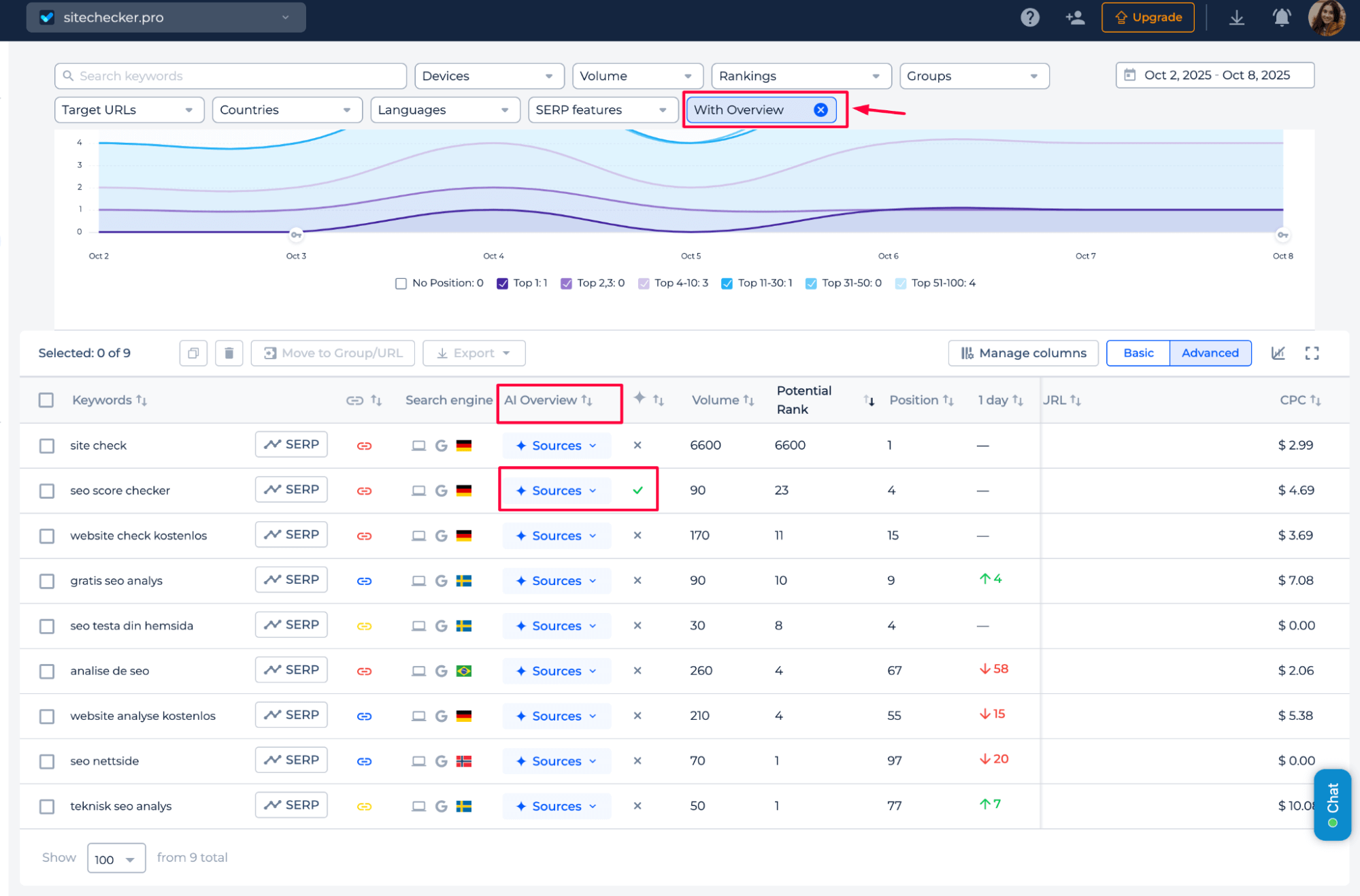
Best SERP keyword rank tracker tool
The SERP statistics feature helps analyze how each page performs in real search results for a specific keyword. It visualizes ranking dynamics for all competitors in the Top 30, showing who gains or loses visibility over time.
By tracking every page’s position trend, agencies can identify which URLs consistently hold top spots, spot volatility, and uncover new competitors entering the SERP, a powerful way to evaluate real competition and content performance.
GSC integration and performance metrics
By connecting with Google Search Console, Sitechecker gives agencies a full picture of how rankings translate into real traffic and visibility. It helps uncover missed keyword opportunities and content gaps, making it easier to focus efforts where they’ll drive the biggest growth in clicks and impressions.
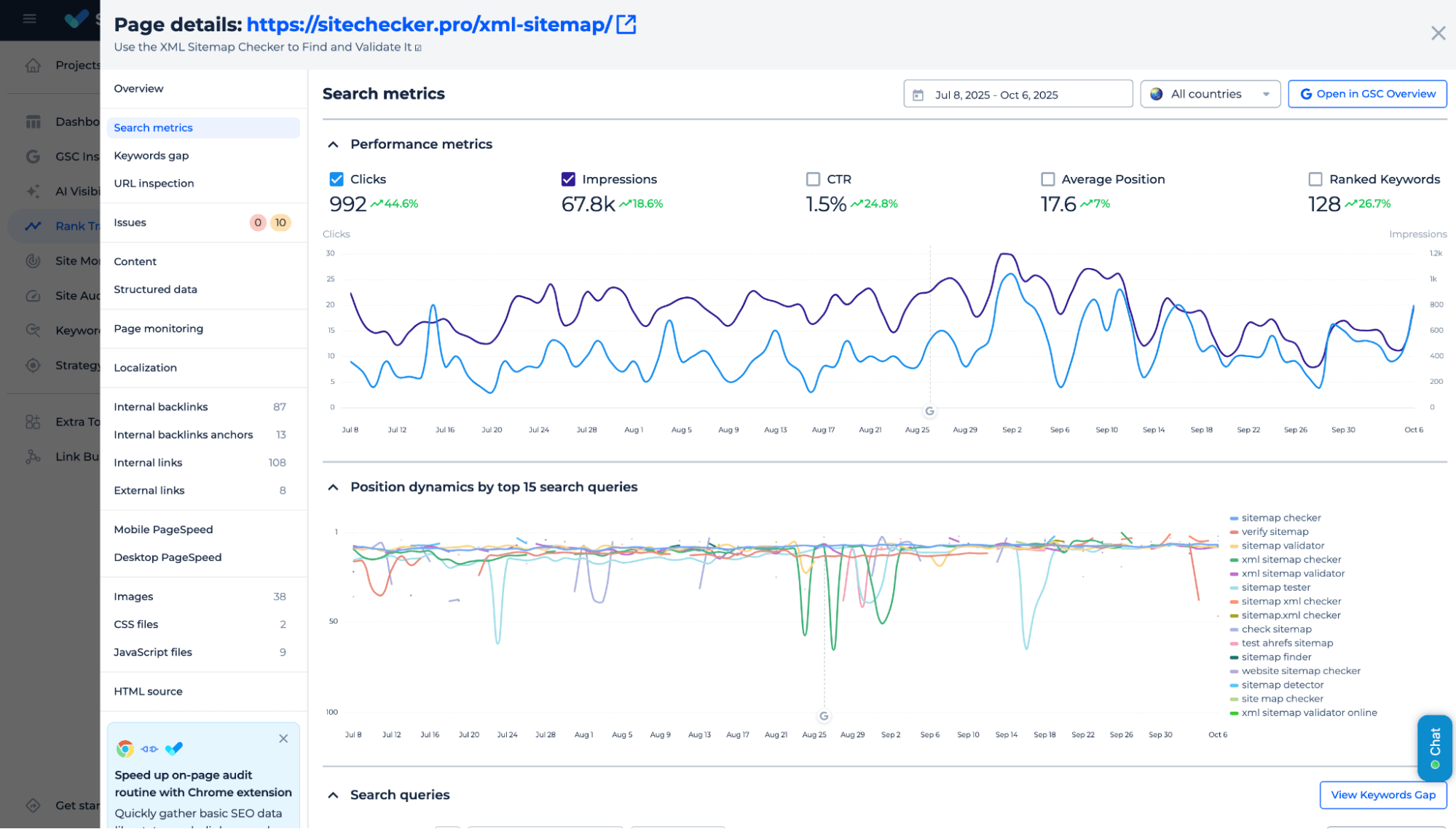
White-label dashboards and automated reports
Share branded dashboards and scheduled reports with clients: all under your logo and domain. This saves hours of manual reporting and reinforces your agency’s brand.
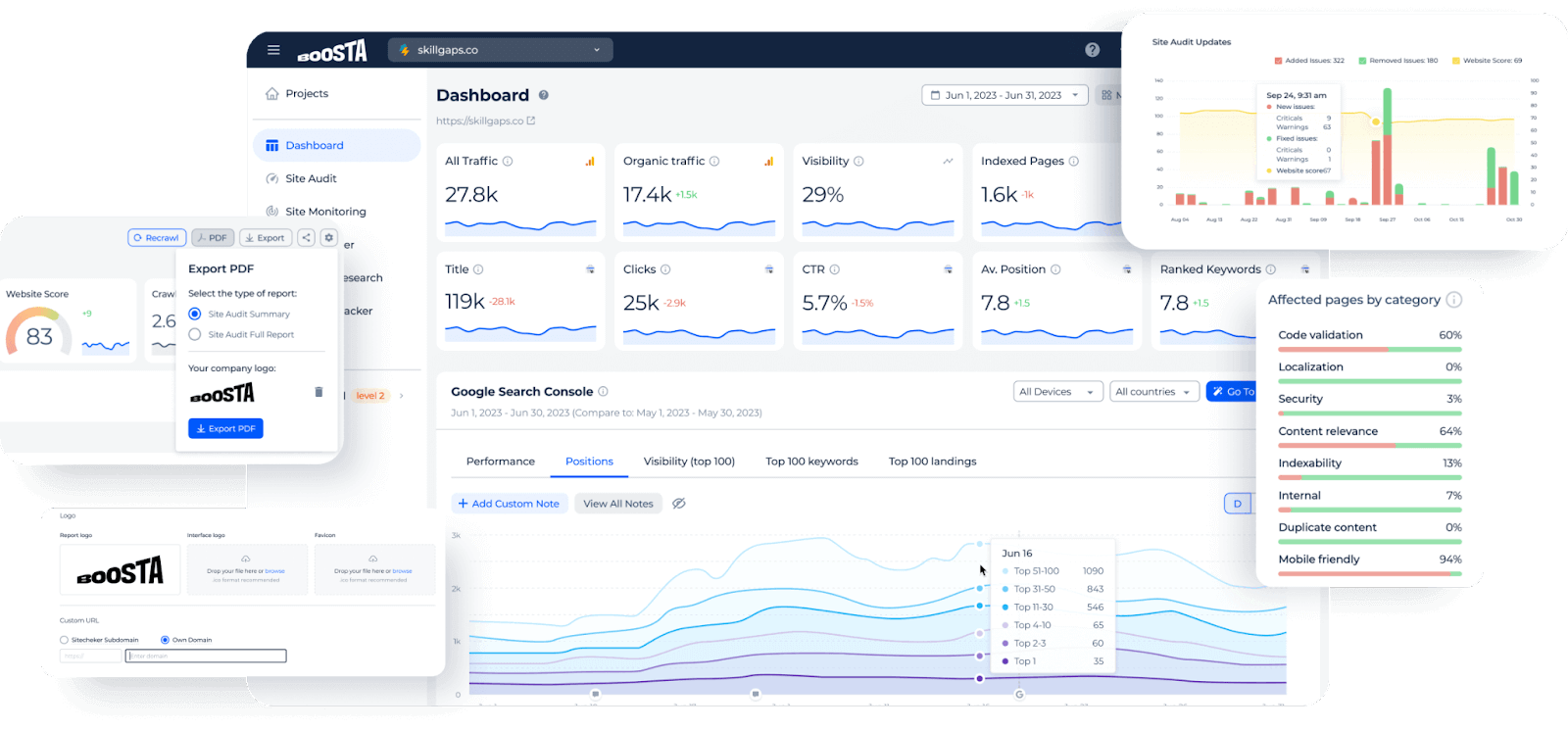
Multi-project management and unlimited users
Manage all client campaigns from one intuitive dashboard. Invite unlimited teammates and clients at no extra cost, ensuring seamless collaboration across the whole agency.
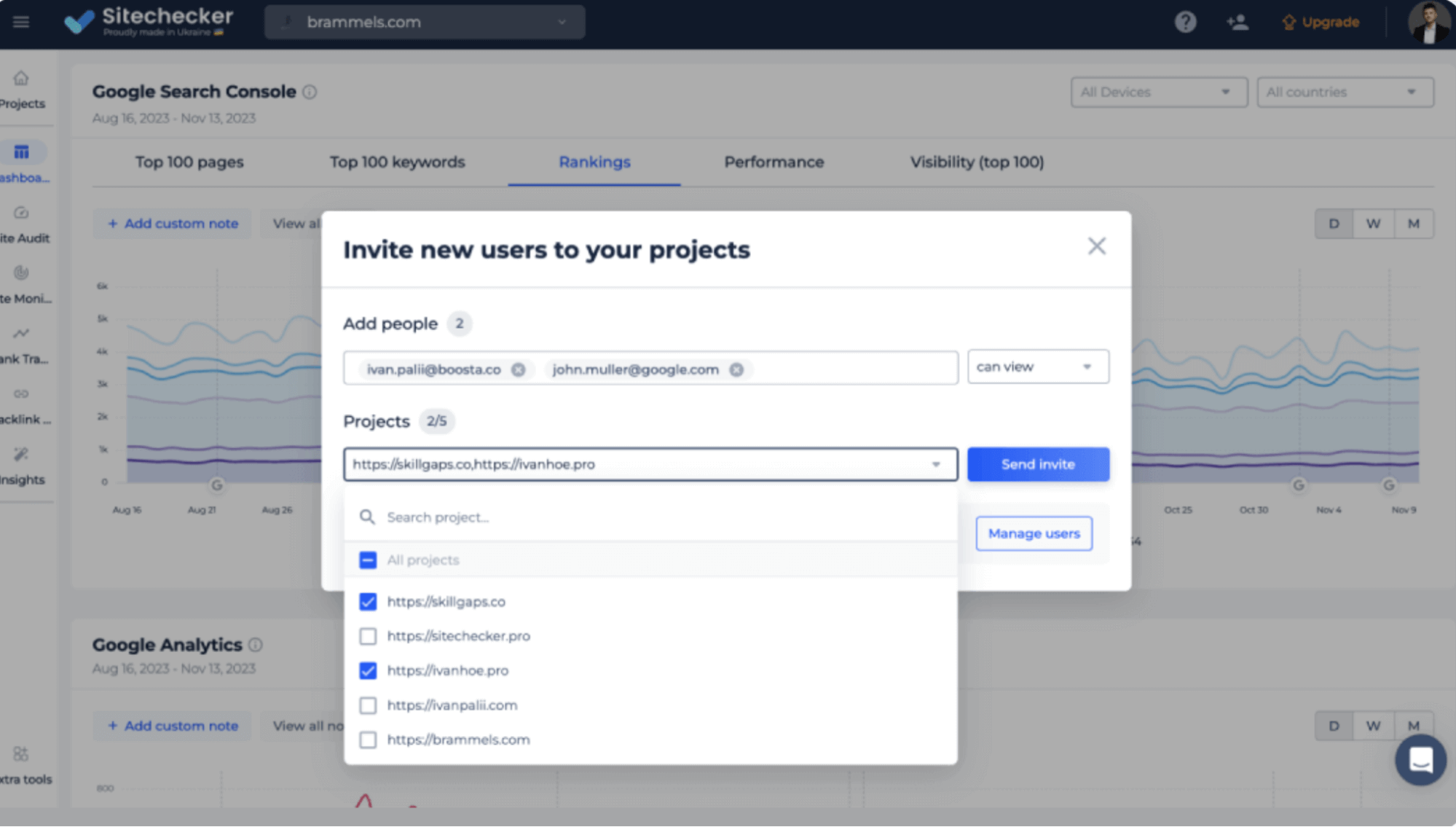
Transparent pricing, all-in-one solution
Every key feature, rank tracking, AI monitoring, GSC data, and reporting, is included in one plan. There are no upsells, seat limits, or hidden modules.
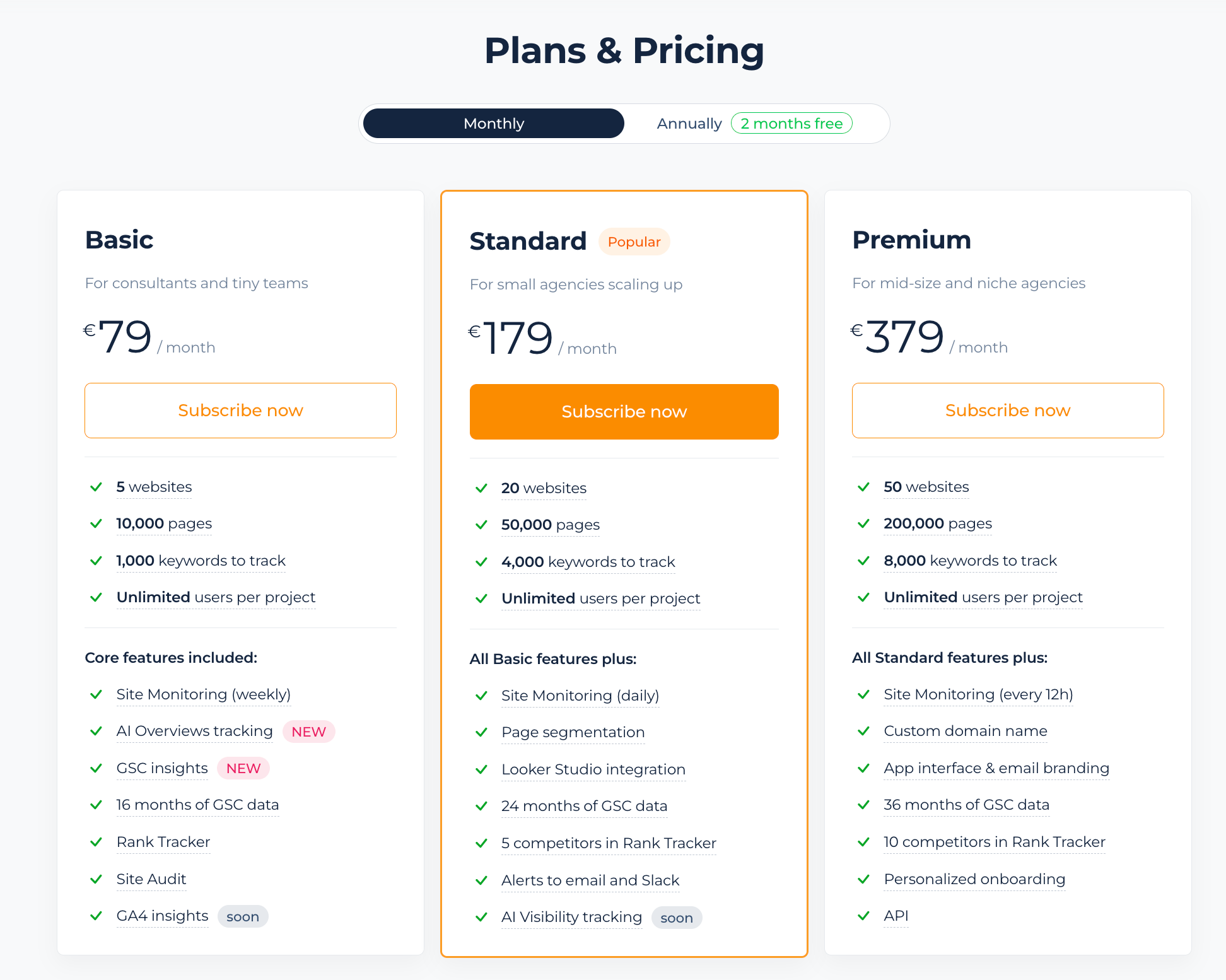
2. Semrush
Semrush offers a position tracking tool that monitors keyword rankings across multiple devices, locations, and search engines. It provides daily updates, visibility trends, and competitive insights, allowing users to measure performance for specific keywords, campaigns, or regions.
However, data from Google Search Console must be imported manually, and each project is tracked separately without a unified multi-client dashboard. Some collaboration and white-labeling options are limited to higher-tier subscriptions, and additional modules are required for full SEO workflow coverage.
Pros:
✅ Daily ranking updates with historical visibility data
✅ Local and device-level keyword tracking
✅ AI Overview and SERP feature detection
✅ Looker Studio integration for flexible reporting
Cons:
❌ No automatic GSC keyword sync inside the rank tracker
❌ Separate dashboards for each project, no unified agency view
❌ White-label and multi-user access only in higher-tier plans
❌ Some advanced features available as paid add-ons
In summary, Semrush provides accurate rank tracking and strong reporting capabilities but relies on additional modules and manual setup to cover full agency needs.
3. SE Ranking
SE Ranking is a comprehensive SEO platform that includes a powerful rank tracker for monitoring keyword performance across Google, Bing, Yahoo, and YouTube.
It delivers daily ranking updates, local and mobile tracking, and competitive comparisons with Share of Voice metrics. The tool also supports keyword grouping, historical data analysis, and AI Overview detection for selected queries.
While the platform covers most key tracking needs, its project-based structure requires agencies to manage each client separately. Some advanced features – including white-label reporting, API access, and Looker Studio integration — are available only in higher-tier plans.
Key advantages and drawbacks
Pros:
✅ Daily keyword updates with historical data retention
✅ Local and mobile rank tracking across multiple search engines
✅ AI Overview and SERP feature tracking
Cons:
❌ Partial GSC integration without full metric syncing
❌ Separate dashboards per project instead of a unified agency overview
❌ White-label and automated reporting available only on advanced plans
In summary, SE Ranking offers accurate and flexible rank tracking for agencies and SMBs but may require higher plans and manual setup for full-scale client management.
4. Ahrefs
Ahrefs provides rank tracking as part of its broader SEO toolkit focused on competitor research, backlink analysis, and keyword performance monitoring. The rank tracker allows users to follow keyword positions across multiple countries and devices while comparing visibility and average position against competitors. It also offers long-term ranking history and share of voice metrics.
However, Ahrefs does not integrate with Google Search Console for combined performance data and lacks AI Overview or SERP feature tracking. White-label dashboards, automated reports, and multi-user collaboration tools are not available, which limits its use for large-scale client management.
Pros:
✅ Reliable daily ranking updates with historical data
✅ Strong competitor comparison and visibility trends
✅ Integration with backlink and keyword databases for deeper insights
Cons:
❌ No GSC integration or AI Overview tracking
❌ No white-label dashboards or automated reports
❌ Limited collaboration tools and no multi-user management
❌ Separate modules required for full SEO coverage
In summary, Ahrefs offers precise keyword tracking and valuable competitive insights but lacks the automation and client management capabilities many agencies rely on.
5. Rank tracker (PowerSuite)
Rank tracker by PowerSuite is a desktop-based SEO tool that monitors keyword rankings across multiple search engines and regions. It supports local and global rank tracking, SERP feature detection, and keyword grouping, with options to analyze competitors and visibility trends over time. The tool provides flexible data exports and integrates with Google Analytics and Search Console, though these connections require manual setup.
Because it runs on desktop software, updates depend on local scheduling rather than cloud automation. It also lacks built-in AI Overview tracking, real-time collaboration, and online dashboards, which limits accessibility for distributed teams and agencies managing multiple clients.
Pros:
✅ Supports tracking across hundreds of search engines and regions
✅ Offers keyword grouping, visibility analysis, and competitor comparison
✅ One-time license option
Cons:
❌ No AI Overview or LLM visibility tracking
❌ Requires manual setup for data imports and updates
❌ No cloud dashboard or real-time collaboration
❌ Limited automation and reporting flexibility
In summary, PowerSuite rank tracker provides robust offline tracking and flexibility for single-user workflows but lacks the automation, AI insights, and collaborative tools expected by modern SEO agencies.
Conclusion
Choosing the right SEO rank tracking software depends on your agency’s need for automation, collaboration, and depth of insights. While tools like Semrush, SE Ranking, and Ahrefs deliver accurate tracking and research capabilities, Sitechecker stands out as the most complete solution for agencies – combining daily updates, AI and GSC integrations, client-ready reports, and unlimited users in one transparent plan. PowerSuite remains a solid desktop alternative for smaller teams, but cloud-based tools with unified dashboards and automation offer greater scalability for growing agencies.




